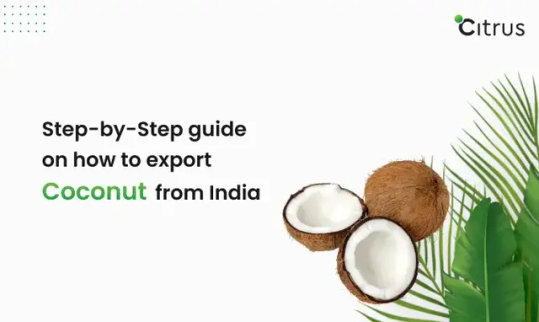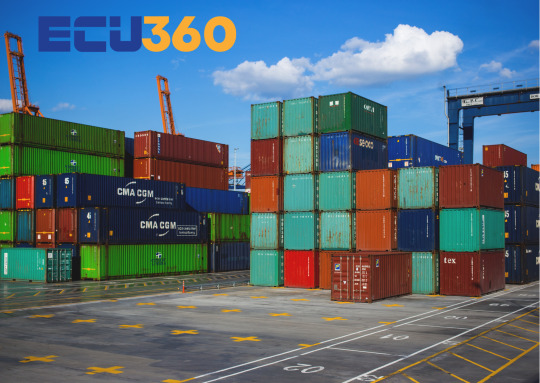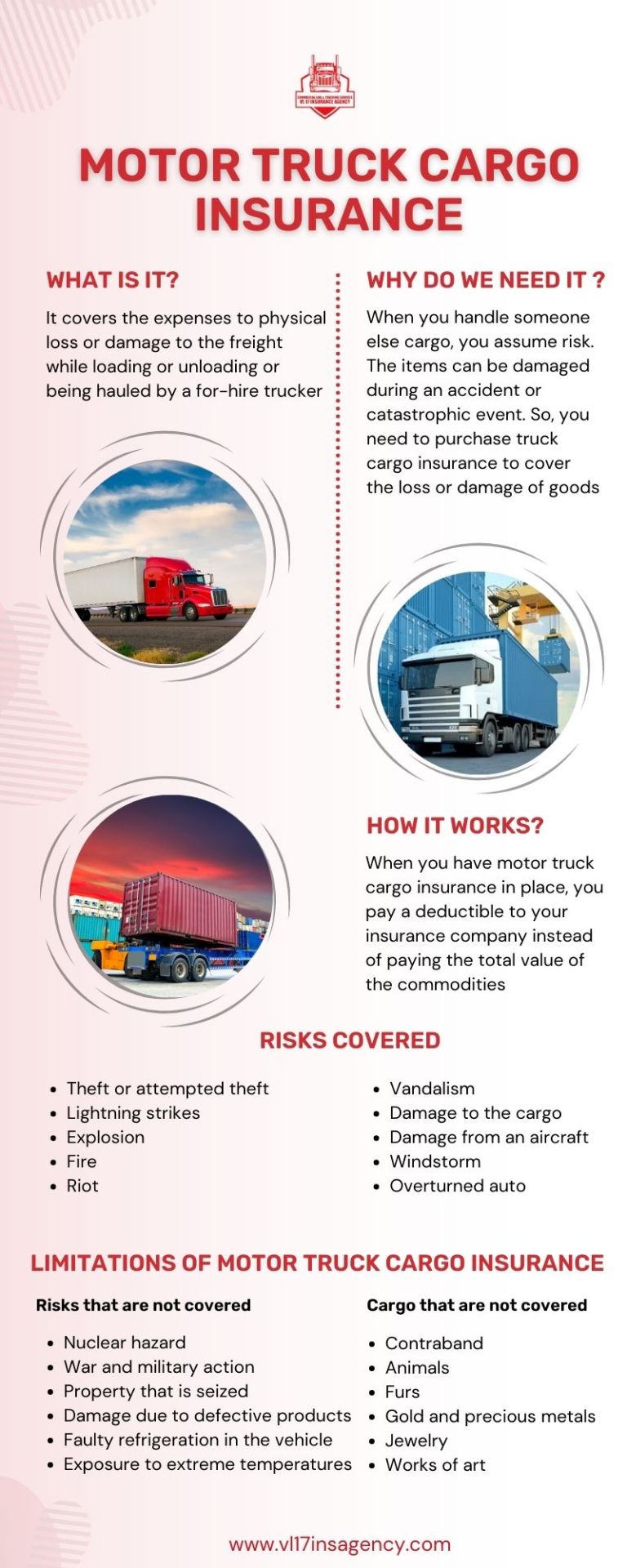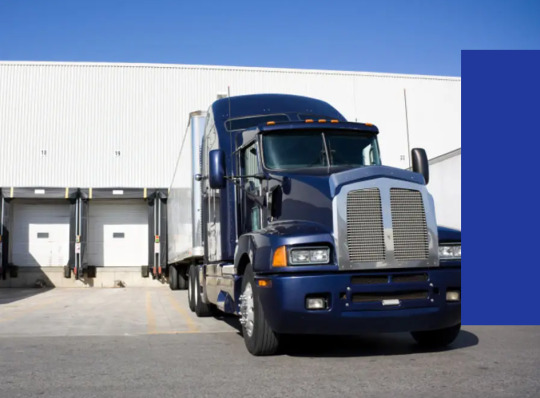#cargo insurance
Text
How to export coconut from India Globally?

Exporting coconut from India to the global market involves several steps and requires adhering to specific regulations and standards. Here’s a detailed guide on how to export coconut from India globally:
### 1. Understand the Market Demand
- **Research Global Markets**: Identify countries with high demand for coconuts and coconut products. The top importers include the USA, European Union countries, China, and the Middle East.
- **Product Preferences**: Determine the preferred type and form of coconut in target markets (e.g., fresh coconuts, desiccated coconut, coconut oil, coconut water).
### 2. Registration and Licensing
- **Company Registration**: Ensure your business is registered with the Ministry of Corporate Affairs (MCA) in India.
- **Import Export Code (IEC)**: Obtain an IEC from the Directorate General of Foreign Trade (DGFT). This is mandatory for any export activity.
- **FSSAI License**: For exporting food products, register with the Food Safety and Standards Authority of India (FSSAI).
- **APEDA Registration**: Register with the Agricultural and Processed Food Products Export Development Authority (APEDA) for better support and guidance.
### 3. Sourcing and Quality Control
- **Supplier Network**: Establish a reliable network of coconut farmers and suppliers.
- **Quality Standards**: Ensure the coconuts meet international quality standards. Implement strict quality control measures, including testing for pesticides and contaminants.
- **Certifications**: Obtain necessary certifications such as Organic Certification, Fair Trade Certification, and ISO standards if required by the importing country.
### 4. Packaging and Labeling
- **Export-Grade Packaging**: Use packaging materials that preserve the freshness and quality of the coconuts during transit. This may include ventilated boxes, plastic crates, or other durable packaging options.
- **Labeling Requirements**: Follow the labeling guidelines of the importing country, which typically include product details, origin, weight, and handling instructions.
### 5. Logistics and Shipping
- **Freight Forwarders**: Engage a reputable freight forwarder who can handle the logistics of shipping your product internationally.
- **Shipping Methods**: Choose the appropriate mode of transport (sea, air, or land) based on the destination, cost, and urgency.
- **Customs Clearance**: Ensure all necessary documentation (commercial invoice, packing list, bill of lading, certificate of origin) is prepared for customs clearance both in India and the importing country.
### 6. Compliance and Documentation
- **Export Documentation**: Prepare all required documents, including the commercial invoice, packing list, certificate of origin, bill of lading, and export declaration form.
- **Customs Compliance**: Comply with the customs regulations of the importing country to avoid delays and rejections.
### 7. Payment and Insurance
- **Payment Terms**: Establish clear payment terms with the buyer. Common methods include Letters of Credit (LC), advance payment, or open account terms.
- **Insurance**: Secure insurance for the shipment to cover any potential losses or damages during transit.
### 8. Marketing and Distribution
- **Marketing Strategy**: Develop a robust marketing strategy to promote your coconuts in the target markets. This may include participating in trade fairs, online marketing, and establishing partnerships with local distributors.
- **Distributor Network**: Build a network of distributors and retailers in the target markets to facilitate efficient distribution and sales.
### 9. Customer Feedback and Improvement
- **Feedback Mechanism**: Implement a system to collect feedback from customers and distributors to continuously improve your product and service.
- **Adaptation and Innovation**: Stay updated with market trends and be willing to adapt your product offerings to meet changing consumer preferences.
### Conclusion
Exporting coconuts from India globally involves a multi-step process that includes market research, obtaining necessary licenses, ensuring quality control, efficient packaging, and logistics management. By adhering to international standards and effectively marketing your product, you can successfully tap into the global market for coconuts.
Contact Citrus Freight for instant freight quotes and reefer container bookings to deliver fresh globally.
#citrus freight#coconut export#fruits exports#vegetable exports#marine insurance#perishable export#cargo insurance
0 notes
Text
Cargo Insurance
Website: https://olcshipping.com/cargo-insurance/
Phone number: +91 9811140464
OLC Shipping provides reliable cargo insurance services to protect the financial interests of shippers and carriers in case of loss or damage to goods during transportation. With the right insurance coverage, businesses can mitigate risks and ensure the safe delivery of their cargo with peace of mind.
0 notes
Text
Cargo Insurance
Cargo Insurance

0 notes
Text
Insurance Coverage acts as an insurance policy in an unpredictable condition by providing protection against unexpected events that could ruin lives and budgets. Southwestern Insurance has more than 20 years of experience helping drivers or truck drivers obtain only the insurance coverage they require, preventing them from paying for any unnecessary amounts. Read this blog to learn more about affordable insurance coverage:
0 notes
Text
The Importance of Cargo Insurance for Shipping Valuable
Ensure the safety of shipping valuables with cargo insurance. Discover the importance of protecting your goods during transportation.
0 notes
Text
Protecting Your Shipments and Ensuring Peace of Mind: Cargo Insurance
When it comes to shipping goods, it's crucial to consider the risks involved during transit. That's where cargo insurance steps in. Whether you choose air cargo solutions, sea freight services, or rely on customs clearance and warehousing, cargo insurance offers valuable protection. In this blog, we'll explore what cargo insurance is, its benefits, and how it safeguards your shipments in various transportation modes.
Understanding Cargo Insurance:
Cargo insurance is a specialized type of insurance that covers the loss or damage of goods during transit. It provides financial protection for the value of your cargo against risks such as theft, accidents, natural disasters, and unforeseen circumstances that could result in damage or loss. This insurance is applicable to different transportation modes, including air cargo solutions, sea freight services, road transport, and rail shipments. By obtaining cargo insurance, you transfer the risk to the insurance provider, giving you peace of mind and financial security in case of any unfortunate incidents.

Benefits of Cargo Insurance:
Comprehensive Coverage: Cargo insurance offers comprehensive coverage for various risks, including theft, fire, accidents, rough handling, natural disasters, and more. This protection extends throughout the entire transportation journey, from the moment the goods leave the warehouse until they reach their final destination.
Financial Security: Cargo insurance provides financial security by compensating you for the value of the lost or damaged cargo. This coverage can significantly minimize financial losses and help you recover from any unforeseen incidents that may occur during transit.
Flexibility and Customization: Cargo insurance can be tailored to meet your specific needs. You can choose coverage based on the type of goods being shipped, their value, and the mode of transportation. This flexibility ensures that you receive the appropriate level of coverage for your unique requirements.
Risk Mitigation: By securing cargo insurance, you effectively transfer the risks associated with shipping to the insurance provider. This mitigates the financial impact on your business in the event of loss or damage, allowing you to focus on your core operations without the burden of potential financial setbacks.
Enhanced Confidence and Trust: Cargo insurance enhances credibility and builds trust with customers and business partners. It demonstrates your commitment to protecting their interests and ensures that your shipments are handled with utmost care and attention.
Conclusion:
Cargo insurance is a crucial component of the shipping and logistics industry. Whether you opt for air cargo solutions, sea freight services, or utilize customs clearance and warehousing, cargo insurance provides valuable protection for your shipments. By mitigating risks and offering financial security, cargo insurance ensures that your goods reach their destination safely, giving you peace of mind and fostering trust in your business.
#shipping and freight forwarder#sea freight forwarder#air cargo services#ocean freight#cargo insurance#cargo safety
0 notes
Text
https://www.dgnote.com
#marine insurance service in mumbai#hull insurance#freight insurance#cargo insurance#open marine specific policy#inland marine coverage
1 note
·
View note
Text
Transportation and Cargo Insurance services | ECU360
We provide special cargo insurance services across multiple industries, Our Cargo Liability insurance policy is available through 15+ carriers, cargo insurance is the most common method used to protect the value of your goods from physical damage, theft, or general accident.

0 notes
Text
Motor Truck Cargo Insurance
Handling cargo involves risks like theft, collisions with vehicles, and other calamities. It is essential to secure the contents of your trucks with motor truck cargo insurance. Here is a comprehensive guide on motor truck cargo insurance that includes all the information you need.

#Motor Truck Cargo Insurance#CArgo Insurance#insurance company#Truck Cargo insurance#Texas insurance
0 notes
Photo

Best Motor Truck Cargo Insurance | Get Cargo Insurance Quotes Today- NITIC
Motor Truck Cargo Insurance Quotes for commercial trucks, coverage includes General Dry Freight Haulers, Automobile Haulers, Refrigerated Food Haulers and Dump Truck Operations. NITIC is a cargo insurance company that specializes in assisting owners and truck fleets in obtaining high-quality and affordable truck insurance with our commercial auto liability policy.
1 note
·
View note
Text
Incoterms in 2023: 5 Common Incoterms Mistakes - Citrus Freight

Incoterms in 2023: 5 Common Incoterms Mistakes to Avoid – Citrus Freight
It is critical to avoid certain blunders while utilising Incoterms in international trade to guarantee seamless transactions and minimise risks.
Download our Android App – Citrus Freight
A few common mistakes to avoid are as follows:
Selecting Inappropriate Incoterms:
Despite their very distinct requirements, several Incoterms® have identical initials, making them easily confused. For example, CIF and CFR The cost of the products, freight expenses, and insurance coverage arranged by the seller are all included in the CIF price. The cost of the items and freight expenses are included in the CFR, but the customer must arrange and pay for insurance separately. Recognise your own and your partner's obligations. CIF entails the seller securing insurance on the buyer's behalf. These Incoterms® are frequently misinterpreted, resulting in the goods being carried without insurance.
Places or destinations must be named specifically:
INCOTERMS® are based on a specific location, such as a terminal or port, where risk and responsibility are transferred. To ensure that all parties are clear on culpability in the case of an occurrence, these locations and/or addresses must be expressly named.
Terminal Handling Charges:
In Incoterms®, the seller is liable for paying terminal handling costs for commodities sent beyond the port of shipment. It is critical to specify who will handle charges in the contract to minimise issues, delays, and unexpected fees.
Identifying Customs Tasks and Responsibilities:
Although Incoterms indicate who is responsible for export and import procedures, it is critical to understand that proper management of these operations necessitates both the buyer and seller being legally authorised as exporter and importer. In order to ship EXW, the buyer must be familiar with export processes in the seller's nation. Similarly, in the case of DAP shipments, the seller must be able to complete import processes and pay VAT in the buyer's jurisdiction.
Ensuring Proper Alignment of Incoterms with Payment Methods:
When using a letter of credit or a documentary collection for payment in international trade, it is critical that the Incoterms rule you select fits the security standards or the regulations provided by the banks. If they don't match, it might cause issues and delays with the payment process. As a result, it is critical to correctly coordinate everything to enable seamless and successful transactions.
List of incoterms 2020 & definitions:
1.EXW (Ex Works): The vendor delivers the items to the customer's location, and the buyer is responsible for all transit and export processes.
2.FCA (Free Carrier): In FCA terminology, the seller delivers the goods to a carrier or a specified place, after which the buyer assumes obligation.
3.CPT (Carriage Paid To): The seller pays for the items' transportation to the target country or specified location but not for import fees or taxes.
4.CIP (Carriage and Insurance Paid To): The seller offers insurance coverage for the items during shipment, similar to CPT.
5.DAP (Delivered at Place): The seller is responsible for delivering the products to the buyer's preferred location inside the destination country but is not liable for offloading.
6.DPU (Delivered at Place Unloaded): The vendor unloads the items at the buyer's preferred location within the destination country.
7.DDP (Delivered Duty Paid): The seller is fully responsible for shipping the products to the buyer's preferred location, including any import fees and taxes.
8.FAS (Free Alongside Ship): At the port of shipping, the seller delivers the items alongside the vessel, and the buyer conducts the loading.
9.FOB (Free on Board): The seller is responsible for loading the items onto the vessel at the port of shipping, after which the buyer assumes responsibility.
10.CFR (Cost and Freight): The seller bears the cost of goods and products to the destination port, but the buyer bears the cost of unloading and import charges.
11.CIF (Cost, Insurance, and Freight): The seller offers insurance coverage for the products during shipment, similar to CFR.
#citrus freight#incoterms#incoterms 2020#common incoterms mistakes#incoterms 2023#cargo insurance#fruits exports#vegetable exports#export insurance#reefer container
0 notes
Text
US cargo insurer announces overseas expansion
US cargo insurer announces overseas expansion
Denver-based essential supply chains insurer Parsyl has opened an office in London, bringing in a UK underwriting team for Parsyl’s Lloyd’s Syndicate 1796.
The data-fuelled cargo insurance company, which insures shippers of sensitive goods such as vaccines, has snapped up Kristopher Kimble, Henry Wood, and Ed Colclough from Aon, McGill and Partners, and AIG firm Talbot, respectively.
“We’re…

View On WordPress
0 notes
Video
youtube
Marine and Cargo Surveyors, Marine-Ship-Cargo-Insurance-Surveyors-services-on-Claims-and-Risks
2 notes
·
View notes
Text
What is the difference between FOB and CIF?
International Shipping Logistics Company in UAE
https://e-ship.sg/assets/img/blog/what-is-the-difference-between-fob-and-cif.jpg
Whether you're selling or buying goods, understanding the different types of shipping contracts-like FOB and CIF-will help you better understand your responsibilities throughout a transaction. This in turn will help you reduce risk and lead to a smoother supply chain. So what is the difference between FOB and CIF? And how does it affect the import and export process?
Free on board (FOB) and cost, insurance, and freight (CIF) are two important rules governing domestic and international trade. These contracts determine ownership and liability from the port of origin to the destination. FOB and CIF are both Incoterms-rules for cargo transport that the International Chamber of
Commerce maintains. Incoterms determine each party's duties and dictate the transfer of ownership during a transaction.
It is vital that companies shipping or receiving goods internationally understand the important implications FOB and CIF have on shipping costs and risks.
FOB: Giving control to the buyer
The FOB Incoterm places most of the responsibility for shipping on the buyer. The seller hands off the goods to the buyer's carrier service at the port. Once the goods cross the ship's rail onto the deck, the supplier's arrangements have ended.
All further responsibilities for freight logistics and unloading belong to the buyer. After the seller delivers the goods onto the vessel at the port of origin, the buyer's chosen carrier transports the goods to the destination.
Buyer Responsibilities:
In FOB, the buyer is responsible for the following:
Paying the freight costs
Paying import duties and clearing customs
Unloading at the destination
When shipping FOB, the seller does not have to pay import duties or manage customs documents for import.
Types of FOB terms:
While FOB makes the buyer responsible for most shipping arrangements after the port of origin, the party that bears the risk for the goods depends on the specific type of FOB terms. There are two types of FOB contracts that determine ownership and liability for products in International Shipments.
FOB DESTINATION:
In FOB destination terms, the seller or exporter remains responsible for the safety of the cargo while it is in transport. Due to this liability, a seller might wish to purchase insurance on the goods. This is similar to CIF terms; however, CIF carries added costs and insurance requirements for the seller.
FOB ORIGIN:
In FOB origin (also known as FOB shipping point), the supplier officially completes the sale by transferring the cargo to its shipping carrier. The buyer becomes responsible for all liability as soon as the goods reach the carrier at the port of origin.
Insurance for FOB:
Neither FOB destination nor FOB origin requires the seller or the buyer to provide Freight Insurance. However, insurance helps reduce the cost of potential damages or losses during water transport.
When shipping FOB destination, the seller should consider purchasing insurance to cover potential losses. When shipping FOB origin, the buyer should consider purchasing insurance for their goods during shipping.
Whether you choose destination or origin depends on the specifics of the transaction and the risk you’re willing to accept. A third-party logistics provider like Dubai Freight Forwarders offers a range of supply chain solutions to manage origin facilities, forecast freight costs, and optimize transportation.
CIF: Giving control to the seller
The CIF Incoterm places the responsibility for paying most shipping expenses on the seller.
Responsibilities for CIF:
When shipping with CIF terms, the seller holds responsibility for the following:
Shipping the goods to the destination port
Paying the freight costs
Paying for cargo insurance
Under a CIF contract, the buyer chooses the port where the seller must deliver the goods. The seller pays for all freight expenses to deliver the shipment to that port. Because the seller must manage the freight and delivery, CIF terms always include a port of destination.
Insurance for CIF:
CIF is one of only two Incoterms that mandate that one party (the seller) provides cargo insurance throughout the shipment’s journey to its port of destination.
Choosing between FOB and CIF:
Companies buying and selling internationally should weigh the benefits of FOB versus CIF before choosing either option. For your company, the right choice comes down to the specific circumstances of the transaction, your shipping experience, and your preference for responsibility.
When to choose FOB over CIF:
Buying FOB requires the buyer to bear much more responsibility for the shipping and delivery of the cargo. However, this can be an advantage. Because FOB transfers the freight responsibility to the buyer, the buyer has an opportunity to search for better freight rates. If you’re purchasing goods, you’ll be able to choose your preferred (and trusted) freight forwarder.
As a buyer, you could also have better access to tracking information for the shipment using FOB. For example, e-Ship offers companies access to real-time data through a supply chain control tower. Finally, by choosing a trusted logistics partner, you can gain better support for your FOB shipments.
When to choose CIF over FOB:
New buyers or importers sometimes choose CIF when purchasing international goods because it reduces the need for logistics management on their end. Since the seller handles loading and freight, the buyer simply has to arrange pickup. This can be an optimal arrangement for inexperienced importers who aren't yet familiar with International Shipping.
However, this usually also leads to higher costs for the buyer because the exporter can choose shipping rates. For example, the seller might increase their margins on the products to cover the costs.
Generally, it's wise to choose FOB if you're buying international goods
#International shipping company in UAE#global shipping company#dubai freight forwarders#cargo shipping company#freight management in uae#logistics company in uae#international logistics companies in dubai#lcl container shipping#cargo shipping companies near me#cargo and freight insurance
0 notes
Text
Cargo Insurance Service Provider | ECU360
We have one of the most experienced networks of cargo insurance specialists and risk consultants. Find out how they can help your cargo business at ECU360. Customizable cargo insurance policies protect your shipments and warehoused, cargo insurance is the most common method used to protect the value of your goods from physical damage, theft, or general average

0 notes